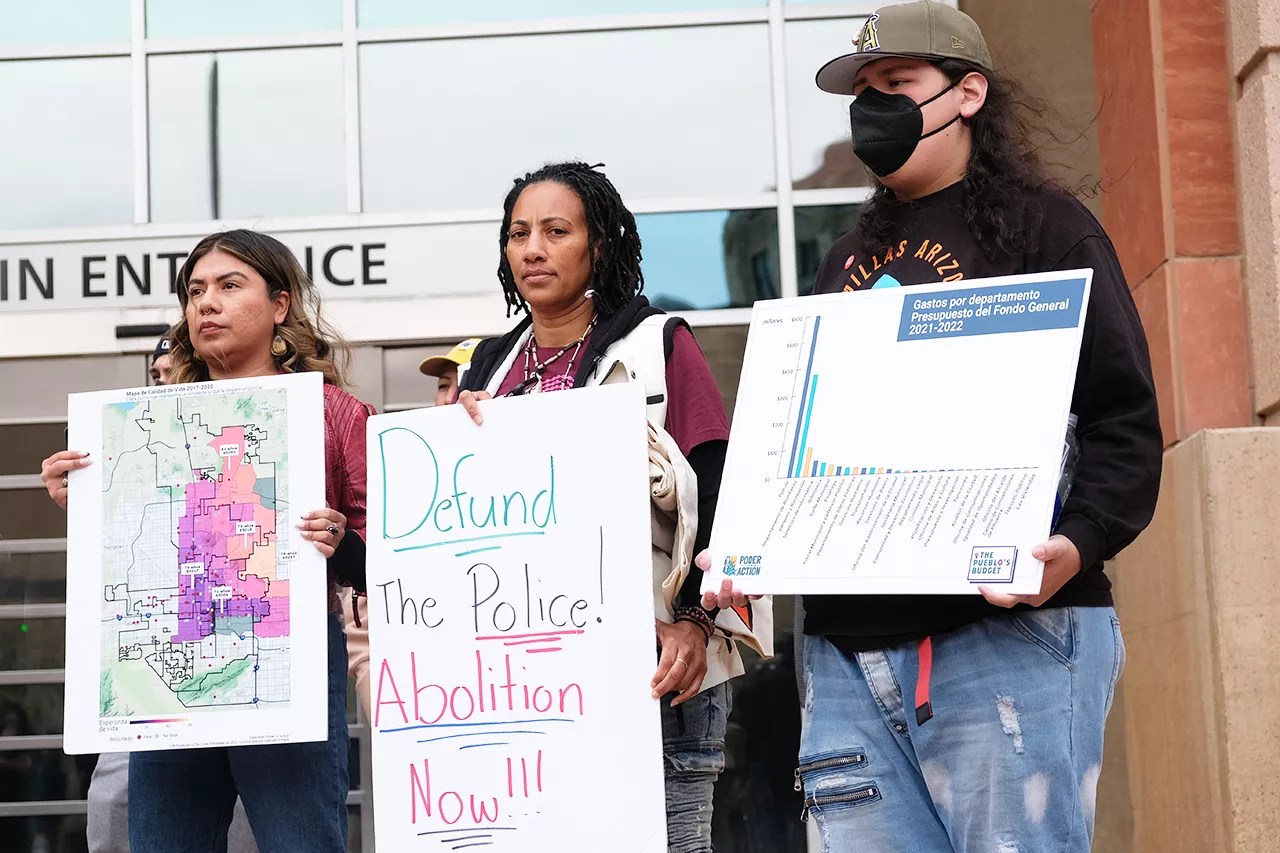
Katya Schwenk

Audio By Carbonatix
Two groups filed separate lawsuits against the city of Phoenix on Wednesday over the lack of transparency surrounding ongoing contract negotiations with a union for Phoenix police officers.
The lawsuits in Maricopa County Superior argue that when the city allowed the Phoenix Law Enforcement Association, the union that represents Phoenix cops, to start bargaining without sharing a draft of its proposals with the public in December, it violated city law.
Local advocacy group Poder in Action, which focuses on local policing and criminal justice issues, is spearheading one of the lawsuits. The group is represented by the People’s Law Firm, a civil rights law firm in Phoenix. The Goldwater Institute, a conservative think tank, also sued the city.
Standing beside activists from other groups including Trans Queer Pueblo and Black Lives Matter Metro Phoenix, activists with Poder in Action held a press conference in front of Phoenix City Hall announcing the suit. “The city and the police department have long promised accountability and transparency,” Viri Hernandez, the executive director of Poder in Action, said during the March 1 event. “But again and again, here we are.”
“We demand Mayor Gallego and city leadership take immediate action and ensure that the Phoenix Police Department is held to the highest standard of transparency,” she added.
Stephanie Barnes, a public information officer for the city, told Phoenix New Times in a written statement that city attorneys are reviewing the lawsuits.
In a statement to New Times, Darrell Kriplean, president of PLEA, said that the police union was simply following the same procedure as other labor unions.
“For the past decade, PLEA has been the only labor group to follow the city charter and submit our proposed MOU [memorandum of understanding] to the city clerk by the deadline,” he wrote. “Now, an activist organization that wants to defund the police is attempting to use the meet and confer process to advance their political agenda. This has nothing to do with their claims of transparency; if it was, they would be demanding the proposed MOUs from all meet and confer groups.”
He added that the union “believes in transparency and accountability.”

Viri Hernandez, the executive director of Poder in Action, speaks at a press conference on March 1.
Katya Schwenk
Draft Contract Kept Secret
Contract negotiations between Phoenix and PLEA began in January and are expected to continue throughout the spring. The negotiations will ultimately decide the provisions of the next police union contract, which governs salaries, discipline, and other department policies.
But so far, the public has not been allowed even a glimpse into the content of those negotiations. Phoenix city code dictates that labor unions should submit a draft memorandum of understanding to the city prior to the start of negotiations, and then the city should provide the public a chance to comment on those proposals.
According to a New Times review, the police union has submitted its proposals for public comment before negotiations for the past decade. That changed in the current negotiation cycle when the union provided only a brief letter to the city indicating that it planned to renegotiate the contract.
The city moved ahead with contract negotiations anyway.
“The cumulative effect of the city’s failures and actions is to completely shut the public out of the employment contract negotiation process until both the city and PLEA agree on the terms of a new contract,” attorneys for Poder in Action wrote in the lawsuit.
In years past, other labor unions also have not provided draft MOUs, despite the city code, and none did so in December. But activists with Poder in Action said their focus was on the police union, given the agency’s $850 million budget and what Hernandez called the agency’s “culture of violence.”
Poder in Action’s suit asks for a judge to issue a restraining order against the city over its “willful refusal to abide by its own city code.” The order would prevent the city from continuing negotiations or approving any contract until the public is allowed the chance to comment on the union’s proposals.

A progressive criminal justice group and a conservative think tank both sued the city of Phoenix over secret contract negotiations with its police union.
Matt Hennie
Goldwater Institute Sues, Seeks Records
The Goldwater Institute also sued the city of Phoenix on March 1 over its police union negotiations and demanded that the city turn over records of the union’s proposals.
After the union failed to turn over its draft proposals in December, the Goldwater Institute submitted a records request to the city seeking PLEA’s draft memorandum of understanding and any communications between city officials and the police union regarding the failure to turn over the contract proposal, according to the lawsuit.
The city denied the request and no drafts existed. The Goldwater Institute submitted a second request in January, according to the lawsuit. The city refused to turn over the records and claimed that doing so “would hinder the negotiations process.”
The think tank’s lawsuit demands that a judge force the city to make the records public.
“The documents at issue in this matter are public records, and the public is entitled to open access to them,” Goldwater Institute attorneys argued in the suit. The lawsuit further asserts that city code mandates that a draft MOU be made public.
“The city of Phoenix has a duty to comply with state law – and the city’s own code – so that residents can find out what their government is up to,” Parker Jackson, a staff attorney at the Goldwater Institute, said in a statement on Thursday.